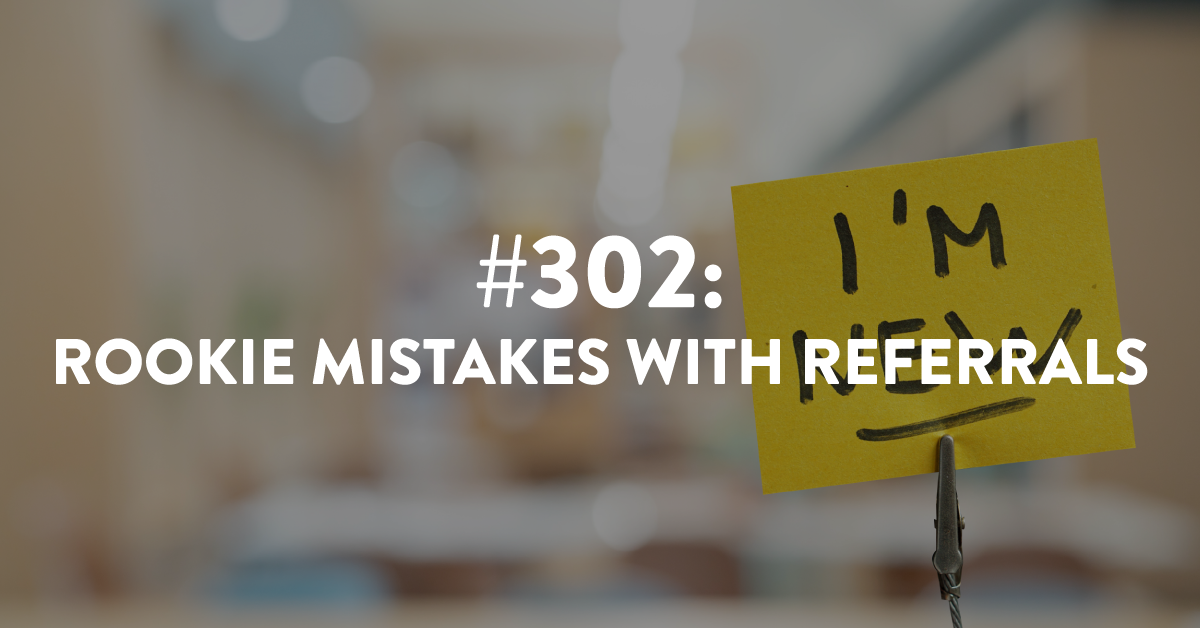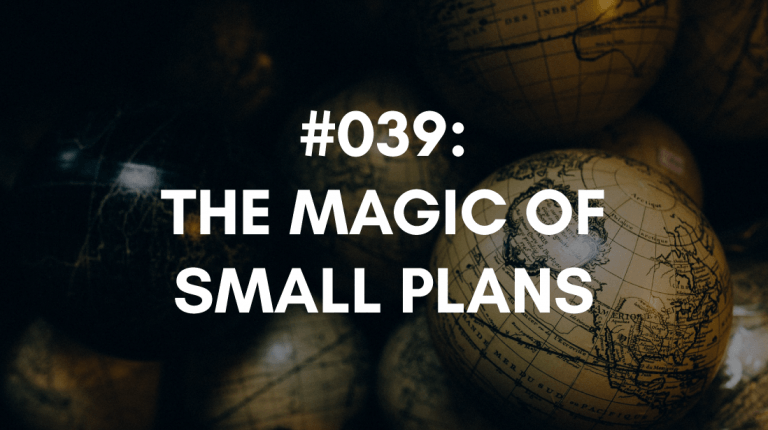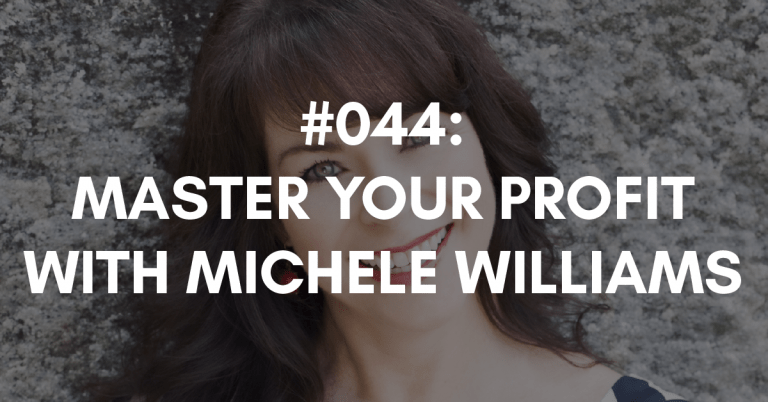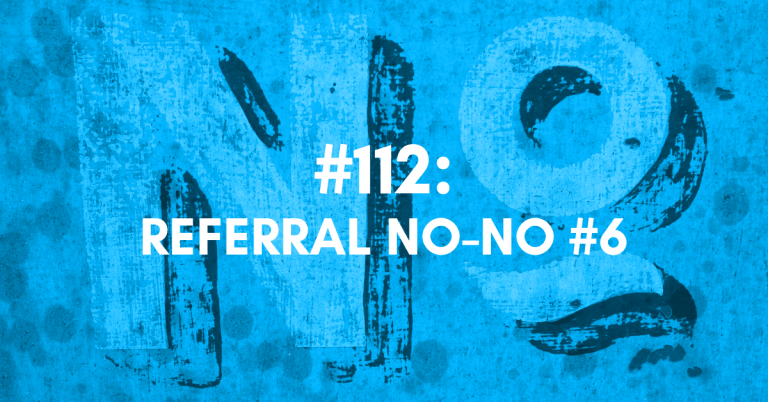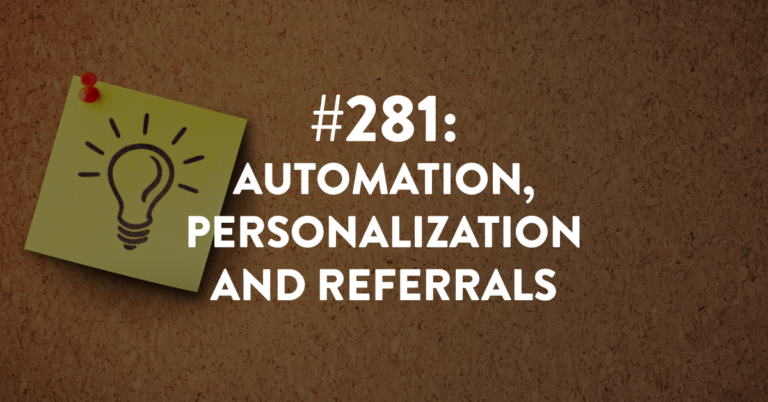Ep #302: Rookie Mistakes With Referrals
In this episode, I discuss five common rookie referral mistakes many people make when trying to build a referable business.
It doesn’t matter if you’ve been in business for three years or thirty. If you’re starting to really think about referrals in your business, you are bound to make a few missteps.
Here’s a quick rundown of the five rookie mistakes discussed in the episode:
- Believing referrals are just another sales activity
- Thinking that referrals just happen
- Lacking the right mentality when caring for existing referral sources
- Not having a manageable plan or defaulting to the easy button plan
- Forgetting to track your referrals
Listen to the entire episode for essential tips to enhance your referral strategy and avoid these common pitfalls. Learn how to approach referrals differently and maximize your results.
Links Mentioned During the Episode:
Download my free referral tracker so you capture and track the right info when you receive a referral
Learn how to work with me inside my Building a Referable Business™ coaching program. Check out the program and then apply to see if you’re a fit.
Want me to build your Referral Strategy for you? Then check out my VIP Referrals In A Day service where I handle the heavy lifting for you. First step is to apply to see if you’re a fit and then we’ll schedule a call. (*A minimum of a 2-person team is required for this Done-For-You service.)
Next Episode:
Next episode is #303, which is another episode created with you and your needs in mind.
Download The Full Episode Transcript
Read the Transcript Below:
Stacey Brown Randall: We’ve all made them. Pretty impossible not to when you’re starting to learn something new or maybe pay attention to something differently than you have before in the past.
What am I talking about? Rookie mistakes. Doesn’t matter if you’ve been in business 30 years or three years. If you’re starting to really think about referrals in your business, you are bound to make a few rookie mistakes. So let me just shortcut that learning curve for you.
Hey there, and welcome to episode 302 of the Roadmap to Referrals podcast, a show about helping you build a referable business. I’m your host, Stacey Brown Randall. My journey from a business failure to a successful business now 10 years in, I know, generating referrals naturally and consistently has made all the difference. Working with clients around the world, we leverage the science of referrals, protect relationships above all else, and help you build a referral business.
I define rookie mistakes as the mistakes you make because you listened to the wrong advice or because you really just didn’t know any better. Because you’re new. That’s like the definition of a rookie, right? You’re new and you’re gonna make mistakes. It happens.
So I’ve been teaching referrals to folks now for over 10 years. I hit my 10-year anniversary in 2023. So I’ve been doing this for a while. And as you can imagine, I have seen it all. I have heard it all. I have probably been asked all the questions that could possibly be asked. But who knows? I may get another question that could come up and stump me one day soon.
But when it comes to rookie mistakes, I see people making the same ones over and over and over again. So I thought we need an episode where I talk about this. Now I’ve done an episode like this years ago, right? Like, as you can tell, cause this is episode 302, I am 300 episodes into this podcast, which means I’ve been doing this for more than five years.
Some of you are newer listeners to the podcast and as much as you actually would probably love to go back and binge every single episode from episode one all the way through wherever where we are now, you’re probably not going to.
There are actually some of you who do and I love you. I adore you. Thank you so very much for being you. But most people are gonna binge at the beginning a couple, and then they’re usually just gonna maybe look for titles that catch their attention through, you know, 300 episodes, and then just pick up where we are now.
So I haven’t talked about rookie mistakes in a very long time, in years, on the podcast, and I was like, oh, we gotta pull this one out of the archives, and we gotta bring this one back to the forefront.
Here’s the thing, though. I’m not actually gonna replay the old episode. I wanna talk about this from a fresh perspective. Because whereas some of these rookie mistakes have not evolved at all in terms of they’re the same mistakes rookies keep making over and over and over again, right?
I also just want to give you a little bit more context as it is in today’s world, which is why we’re not just going to play the episode from however many years ago that episode was or, you know, and just play it for this piece.
I’m actually going to record these rookie mistakes for you. And of course, these aren’t all the rookie mistakes that I see people make, but they are some of the bigger ones I just don’t want you to make. So let’s dive in.
Rookie mistake number one when it comes to referrals. Number one, believing that referrals are just another sales activity.
When you are deciding that, hey, I want to focus on referrals, I want to get more clients by referrals, naturally your mind goes to a place where you’re like, OK, so this falls under the realm of business development. This falls under the realm of sales. This is a way that I’m going to generate new prospects that have the potential to be my next client.
And so you lump it under sales and you lump it under business development. It’s just a tactic. It’s a strategy. It’s a thing I do to be able to generate clients. And you may think about it as no different than maybe the networking that you do.
It’s no different than having the website that you have. It’s no different than having the call to action that you have in your social media post. We start lumping together the activities, the tactics that we do under the realm of business development and sales. And referrals kind of gets lumped into it.
Well, when you lump referrals into how you think about networking, or how you think about cold calling, or how you think about trying to get earned media, or how you think about the marketing that you do, the prospecting that you do, when you think about referrals in that nature, you then attach a mentality to it.
You then attach a mentality of what you should be doing, and how long it should probably take, and ultimately what you’ll be saying. And it leaves out the idea of knowing that in this case of referrals, yes, it is a business development source. It is a source that will bring you new sales. It is a source that will bring you new clients. We talk about that.
Referrals is just one source of many, many sources of how you can bring in prospects, leads, whatever you call them, that become new clients into your business. But when you group them into, and you just kind of refer to them as everything else that’s prospecting and marketing in nature, you apply that mentality to referrals, and it’s just different.
Because when I’m doing cold calling, I’m trying to get the prospect to answer the phone and not hang up on me. When I’m doing referrals, when I’m trying to generate referrals, I’m never talking to the prospect. I don’t know who the prospect is.
I am actually having a conversation, or nurturing a relationship, or cultivating that relationship with a referral source who they know who the potential client is. And so you have to think about referrals differently.
So if you believe that referrals are just like that leads group that you attend, or it’s just like that webinar you’re going to put on, or it’s just like those ads you’re going to run, when you think about referrals as just any other type of sales activity, you shortchange and you miss the opportunity to actually develop a fully functioning and working strategy within your business to generate referrals because you just treat it like a one-off like you do everything else.
I just go to that leads group every week. I go to that leads group, that organization, that association every month. I just got to treat referrals in the same way, and you can’t because it’s just different.
So that’s the first thing I need you to understand, right? If you’re thinking, if you’re making this mistake, right, it is okay. All these mistakes can easily be fixed. Not a problem. I gotcha. Do not worry about it.
So the first thing I need you to know is that referrals are not just another prospecting or marketing activity. They are its own standalone activity, strategies, tactics, what you do, mentality, mindset. Even like how long you think it’ll take before something will happen or work with referrals. Like all of that is just different when it comes to referrals that it’s going to be different from prospecting and marketing.
So don’t believe referrals is just one more activity that you do. You need a standalone strategy that’s built in the right way that takes the science into account and understands exactly what you’re trying to accomplish.
So number one thing I want you to believe Don’t believe that referrals are just another sales activity. What I want you to believe is that, and know, and understand, and act on, is that referrals is the third leg to your three-legged sales stool.
You’ve got prospecting, you’ve got marketing, and you have referrals. It is separate, it is different, and it needs its own strategy, it needs its own mindset, it needs its own execution behind it.
Alright, let’s talk about rookie mistake number two. Rookie mistake number two that I see people do is just believing referrals just happen. It’s like you’ve been told enough times, if you just do great work, you’ll get referrals. And then you start wondering, well, I guess I’m not doing great work because I’m not getting any referrals.
Don’t worry, it’s actually not you. Because if all we had to do was do amazing work for our clients, and then the referrals would just rain down upon us, well, you wouldn’t be listening to this podcast and you’d have zero problems in the world because it actually doesn’t matter how amazing you are.
It actually doesn’t matter how much your clients love you. It actually doesn’t matter how much value you provide to your clients. That isn’t going to ultimately make them refer you. Now it will make some of them refer you, but those are what we call natural connectors. They were going to do it anyway.
And so to get those clients who can love working with you, who can be so excited that they said yes and gave you money, getting them to then also refer you, that takes something totally different than just delivering amazing quality work.
Yes, you need to deliver amazing quality work AND you got to put some things in place to ultimately allow you to be able to generate and cultivate those referrals. They don’t just happen, so don’t believe they just happen.
It may feel like they just happen when one shows up and you have no idea what you did to receive it. I bet I could unpack the pattern for you. But if you told me how your last five referrals showed up, who they showed up for, when they showed up, and some context around them, I could probably tell you what you were doing that allowed that referral to happen.
Because there is always a how behind it when a referral shows up. There’s always a pattern. There’s always a how. There’s always a trigger on some level. And so believing that they just happen is falsity. Do not believe that they just happen. What I need you to believe is that to have referrals happen, you can’t just do amazing work and referrals will show up.
You don’t have to sit around and just hope as your strategy that referrals will show up. You can still be super grateful when they do, right? But you’re actually going to need a plan of action. You’re going to need strategies. You’re gonna need tactics. You’re gonna need the right things at the right time with the right language to be able to generate those referrals that you want.
If you’ve ever been through one of the private live trainings that I do for people who are interested in joining my coaching program, BRB, Building a Referable Business, if you’ve ever been through one of the private live trainings that I do, and this is where you complete an application, and then sometimes, depending on when you apply, I probably have a live training coming up. I do it about three times a year. January was the last one I did. And if not, sometimes we will send you the recording, the replay to that training.
And when you watch and go through and watch that training, which kind of unpacks the framework of what I teach, why it works, and it unpacks the calculations that you need to understand of what’s actually possible from an ROI perspective with referrals based on your data. And then it goes into actually what’s included in BRB and how I get my clients to success and all the transformations that you ultimately end up having.
When you go through that coaching program, and I show results, I show this bar chart of results of an attorney that I have in my program who right now in 2024 is in her eighth year with me. And I show the bar chart of where she started from.
It was a little, little, little, tiny marker, averaging 12 referrals a year. And then I show how she grew to 40 in her first year. And then she went to 50s, and then the 60s, and then the 70s, and then the 80s.
And I show that trajectory of the last seven years of that growth. That’s 40 new clients in her first year, and 85 new clients in her seventh year. None of that just happened, my friends. None of that just happened.
The 12 that she got before she started working with me and being intentional about referrals and thinking about referrals correctly and doing the right things, the 12 just randomly happened.
The 40 in the beginning, in the first year, upwards to the 80 plus in the seventh year, yeah, no, no, no. None of that just happened. There was a reason behind it. There was action taken. There was the right things at the right time with the right language for the right people.
And so please do not believe that referrals just happen. I have a lot of folks, it’s a classic rookie mistake to be like, well, they’re just going to happen. Nope. No, they’re not. You can do something about it.
Hey there, pardon the interruption. It’s crazy to think that you could be just 90 days away from doubling or tripling your referrals. The roadmap and the support, plus the accountability and the access to me that you need is just waiting on you. It’s all inside my coaching program, Building a Referable Business, or BRB for short. Go to StaceyBrownRandall.com/referable to learn about the program and click on the link to submit your application. Do it. Do it now. Do it today. Now back to the episode.
All right, so here is rookie mistake number three. Rookie mistake number three is lacking the right mentality when caring for your existing referral sources. So we define existing referral sources as the people who have referred you. They can be active or inactive depending on how long it’s been since they have referred you.
But when you have a group of existing active referral sources, these are people who have referred you, and that means they’ve actually referred you in the last two years. I noticed that some people just lack the right mentality about how to care and nurture those relationships with that group of people specifically to be able to generate more referrals.
They think to themselves, well, that newsletter I send out once a month is good enough. That e-newsletter that I email out or newsletter that I mail out once a month is good enough. Or they think to themselves, well, I have coffee with those folks about once a year and that’s good enough.
Or they’re actually, when they look at the list, they say to themselves, wow, I actually just ignore those people for nine months at a time. And then they’re like, oh my gosh, I’ve been ignoring people. Let me do something really fast. And I send them a gift, a random gift that comes out of the blue that means nothing or doesn’t have any context behind it. Not that your gift doesn’t mean anything, but there’s no context to why the gift matters.
And so I just find that people, they don’t think about how to care for the people who are already referring you, correctly. They just lack that right mentality because they don’t know any better.
And so it’s important that we recognize that what you’re going to do is actually going to be focused. And there’s a lot of science that comes into place here about how I build out the framework.
There’s like this four-part framework that I build out for folks when they are learning what your outreach, your touchpoint should look like, right down to who they’re about, why they matter, how you have people who actually remember them, based on what you’re doing, how often you’re supposed to be doing, and what the heck you’re supposed to be saying while you do it.
It’s a whole framework so that it makes sense. Which, as you can imagine, then your e-newsletter is never going to show up on my plan for your referral sources. I’m not going to let it.
I mean, I can’t keep you from doing it, I guess, but I don’t care if your referral sources are getting your monthly newsletter, great, it’s not doing anything for you.
You need to have something else running behind the scenes that’s ultimately helping you nurture that relationship. So I find that people just really have that lack. They just lack the right mentality, the what I’m supposed to be doing, what I’m supposed to be saying, and why I’m doing it when they’re trying to care for the people who are already sending them referrals.
Okay, rookie mistake number four. It’s lacking a plan that you can manage or defaulting to the easy button plan. So this is a twofer when it comes to a rookie mistake. Lacking a plan that you can manage.
Sometimes I have people that I talk to and they’re like, I’m going to do this and then this and then this. And then by the time they get done telling me all the things they’re going to do, that’s going to be their plan to either generate new referral sources or take care of their existing referral sources or whatever it is, I’m like, I’m exhausted just listening to you.
And I know execution is going to be where the downfall happens, is where the failure is going to occur, is within that execution. When you build a plan, you better be able to manage it. When people build out a plan, right, when they’re working with me and my programs, we have a conversation about, can you manage that?
If I know I’ve got a CPA or a bookkeeper that’s going through the plan and they’ve got like these, like this big, huge touchpoint happening, like in March and April, I’m like, are you sure? Like, will you be able to manage that? Who’s going to do that when you’re busy doing all those tax returns, or getting ready everybody’s bookkeeping to give to the CPA so the tax returns can be done if you’re a bookkeeper, right?
So it’s, you gotta focus on what you can manage. Again, it can’t be, but here’s the thing, so when I say, you know, you need a plan that you can manage, some people then just default into whatever’s gonna be the easiest for me to do. I don’t mean that.
I don’t want you defaulting into what’s easy for you. I want you having the right plan that’s going to work, but it is also taking into account what you can manage and what you will comfortably be able and willing to do.
So don’t build out this crazy plan. You’re like, I’m going to do all these touch points and all these things and all this stuff’s going to happen. Look at this rotating calendar. I look at that stuff and I’m like, yeah, okay, execution’s gonna be a beast and you’ll probably get a couple months into it and then you’ll probably get busy and then all of a sudden you won’t be executing and then nothing happens because you build a plan bigger, right, than you can actually manage.
It’s like going to a buffet and being super hungry and you put more food on your plate because your eyes seem to be a little bit hungrier than your actual stomach. It’s the same thing.
So I see a lot of rookies, when they’re trying to make sure referrals are going to happen in their world, they want more referrals, a rookie mistake that they make is that they don’t actually think through the plan that they can manage, that is possible for them, while still actually having the results they want.
So if they are trying to build out a plan they can manage, and they get in their heads, I got to be able to handle this, don’t also be the person who defaults into the easy stuff. Oh, I’ll just send out a couple of newsletters and all will be good. Well, all will be good in terms of the newsletters that you’re sending out, but not necessarily in terms of the referrals you are receiving.
And here’s rookie mistake number five. It’s a favorite of mine. It’s a personal favorite. Lack of tracking. I was on a call with a managing partner of a law firm, and we were talking about a presentation that I will be giving to his company.
And he mentioned to me, he was like, we track in our database where all of our prospects, our potential clients come from. And we also track the name of the person who referred them to me.
And I started clapping right there on the call. I was like, thank you, thank you, thank you. That makes my life so much easier. Like, oh my gosh, we can just like jump through the hoops of the recreating the data and making it there and building it if we don’t have it and just jump right into the now, what are we going to do with this data?
And that was his question. He was like, we got the data. What do we do with it? I’m like, oh, let me solve that problem for you. Got it. That I can get to work on ASAP.
But if you’re not tracking what’s happening with your referrals correctly, consistently, all the C words that we love so much. If we’re not tracking what’s happening with our referrals, then you certainly can’t make a plan for how you’re going to make it better because you don’t even know what’s happening because you’re not tracking. So please, please, please, please, please track your referrals. It is so important.
I’m gonna put a link in the show notes. So if you go to the show notes page for this episode, which is StaceyBrownRandall.com/302. If you will go to the show notes page, I’m gonna include a link that will take you to the tracker that I tell people to use. It’s really simple.
I mean, like, track it in your Excel spreadsheet, track it in a Google spreadsheet, track it in a document, track it in a cloud-based CRM, some kind of database, right? Client Relationship Management Tool. I don’t care. Please track it, though.
And here’s what you need to be tracking. Not only do you need to be tracking the date at which that client comes to you, or at least the month or at a minimum, I guess, the year that you get that prospect and you’re going to track that prospect’s name, you’re also going to track where they came from. And if it is referred to you.
So Facebook ad can just say Facebook ad. Met at a networking event can just say the name of the networking event. That’s where you met that prospect. But if that prospect was referred to you, I need a name. I need a name. So I need to say, Sam was referred to me by Amy. I need Amy’s first and last name, actually. So that’s the big thing I need you tracking when it arrives.
Now, I will also want you to track other things, right? I also have my clients track, not only do we track those three things, like the date, the prospect’s name, and the referral source’s name when the prospect comes through referrals, we’re also then going to track like the outcome.
Did they become a client? Are they on hold? Are they in process? And we’re going to update that regularly. And we’re also going to track revenue.
Because I actually want to know how much money are you making from these referrals you’re receiving. Not only how many are you closing. All that stuff matters. All that stuff matters for me from an ROI perspective for my clients. So that’s why we track it.
But I find that people have this lack of tracking. And I don’t know if it’s because you get some referrals and you’re like all excited and you like, have some processes you put in place, but because you don’t actually have standard operating procedures or processes or strategies or anything, you just kind of forget.
But like, it is like an if then, right? If I receive a referral, then I go track this thing. And this is where I’ve decided to track in my own business. Like that is the conversation I need you to have yourself. It is a huge rookie mistake for you not to be tracking correctly and consistently. You got to track.
So I’m going to put it in the show notes just go to the show notes for this episode, as with every episode, all the resources that are mentioned. And in particular, this tracker that you can then download can be found at StaceyBrownRandall.com/302, and that is for episode 302.
Okay, so in wrapping up, let me hit again real fast, rapid-fire format, the five rookie mistakes that I don’t want you to be making.
Number one, believing that referrals are just another sales activity. They are not.
Number two, believing that referrals just happen. They do not.
Number three, lacking the right mentality when you’re caring for your existing referral sources.
Number four, lacking a plan you can manage, or just defaulting to the easy button plan. Don’t do that.
Number five, lack of the right tracking. Make sure you are tracking this information.
Again, resources can be found at StaceyBrownRandall.com/302. Go get your tracker if you don’t have one.
And we’re back with another great episode next week created with you and your needs in mind. Until then, you know what to do, my friend. Take control of your referrals and build a referral business. Bye for now.

